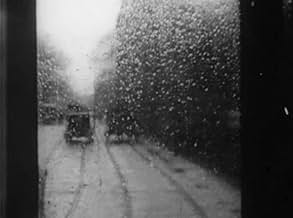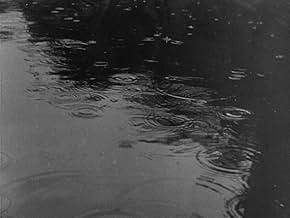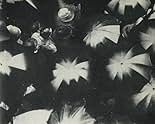Regen is an experimental documentary film directed by Joris Ivens in 1929. It can be defined as a cinematic-poem. In 2021 Breve Storia Del Cinema restored the film with a new score composed ... Read allRegen is an experimental documentary film directed by Joris Ivens in 1929. It can be defined as a cinematic-poem. In 2021 Breve Storia Del Cinema restored the film with a new score composed by Nikolas Labrinakos.Regen is an experimental documentary film directed by Joris Ivens in 1929. It can be defined as a cinematic-poem. In 2021 Breve Storia Del Cinema restored the film with a new score composed by Nikolas Labrinakos.
Featured reviews
The above review strikes me as particularly unhelpful for people who are actually interested in avant-garde, and poetic cinema. Yes it is slow, if you were expecting an action movie, and yes it is a silent film, but there are very few silent films which explore the poetry of the banal, the sublime everydayness of existenz. To me, it is one of the most beautiful and subtle films of all time, and is one of the first genuine "poem" films (along with H20 by Ralph Steiner, Manhatta by Paul Strand, Berlin: City of a Symphony by Walter Ruttman, and $24 Island by Robert Flaherty among others).
The French philosopher Gilles Deleuze (in his book on cinema, The Movement-Image) gives a wonderful reading of this film in which he argues that the film is no longer a representation of rain, but is attempting to give the viewer the feeling, or pure "quality" of rain, called a "qualisign". The editing is not unlike Robert Bresson in the fragmentation and use of what Deleuze calls the "any-space-whatever". In Rain the shots do not have a signed linear sequence, and have no forward movement in time (there is no character moving through the spaces, nothing to make one shot "before" or "after" another one in time). This means that all of the shots could have happened all at the exact same time, theoretically. This is one of the qualities of an any-space-whatever, a space in which the spatial and temporal potentials are de-connected (unlike a fiction or documentary film which has cohesive spatial and temporal dimensions).
Amazing movie which has gone on to influence many great poem-film-makers like Stan Brakhage, Marie Menken, Joanna Margaret Paul, Nathaniel Dorsky, Alexander Greenhough, myself and many others.
The French philosopher Gilles Deleuze (in his book on cinema, The Movement-Image) gives a wonderful reading of this film in which he argues that the film is no longer a representation of rain, but is attempting to give the viewer the feeling, or pure "quality" of rain, called a "qualisign". The editing is not unlike Robert Bresson in the fragmentation and use of what Deleuze calls the "any-space-whatever". In Rain the shots do not have a signed linear sequence, and have no forward movement in time (there is no character moving through the spaces, nothing to make one shot "before" or "after" another one in time). This means that all of the shots could have happened all at the exact same time, theoretically. This is one of the qualities of an any-space-whatever, a space in which the spatial and temporal potentials are de-connected (unlike a fiction or documentary film which has cohesive spatial and temporal dimensions).
Amazing movie which has gone on to influence many great poem-film-makers like Stan Brakhage, Marie Menken, Joanna Margaret Paul, Nathaniel Dorsky, Alexander Greenhough, myself and many others.
This silent film from Holland depicts the start and affects of a rain shower in the city of Amsterdam. It is a very beautiful movie with a good score, but the movie is definitely slow. It is not particularly interesting either. It is just an old and simple silent film that is not especially important. If you get chance to see it, you should just to see how far film has come in 70 years.
Summertime wasn't made for a German count
. There are a lot of dangers outside the cosy gloomy of the Schloss; as for example, hordes of tourists who invade everyplace in order to take the most useless souvenirs or take useful pictures of this Herr Graf's Schloss,(However, this a minor problem that is solved easily by loosing a pack of hungry and ferocious Alsatian hounds). And besides this nuisance one has to deal with the rays of the sun that put at risk the characteristic aristocrat skin color not to mention the heat that can have terrible consequences for the aristocratic body, even sweat.
So, in order to avoid the summertime dangers and while hoping and sighing for the cold and dark winter, this German count decided the short film "Regen" ( Rain ), directed by Herr Joris Ivens in the silent year of 1929, was the perfect choice for the Schloss theatre. Herr Ivens was a Dutch filmmaker who experimented with the avant-garde, and "Regen" is one of the most avant-garde of Dutch films, a work that besides refreshing the atmosphere and the aristocratic mood, is a beautiful symphony of delicate water. It is deceptively simple but the artful visual composition made by Herr Ivens is evocative, sensitive, even nostalgic, a splendid collection of images about the daily and rainy life in an European city or how the rain is unchanging.
The film montage is absolutely brilliant, a gallery of images that depict a simple but lovely story of urban raindrops. It celebrates one of those remarkable little things that unfortunately go unnoticed, until Herr Ivens' skillful experimental direction, shows us the greatness and beauty of a rainy day.
And now, if you'll allow me, I must temporarily take my leave because this German Count must meet a fat and rich Teutonic heiress, rain or shine.
Herr Graf Ferdinand Von Galitzien http://ferdinandvongalitzien.blogspot.com/
So, in order to avoid the summertime dangers and while hoping and sighing for the cold and dark winter, this German count decided the short film "Regen" ( Rain ), directed by Herr Joris Ivens in the silent year of 1929, was the perfect choice for the Schloss theatre. Herr Ivens was a Dutch filmmaker who experimented with the avant-garde, and "Regen" is one of the most avant-garde of Dutch films, a work that besides refreshing the atmosphere and the aristocratic mood, is a beautiful symphony of delicate water. It is deceptively simple but the artful visual composition made by Herr Ivens is evocative, sensitive, even nostalgic, a splendid collection of images about the daily and rainy life in an European city or how the rain is unchanging.
The film montage is absolutely brilliant, a gallery of images that depict a simple but lovely story of urban raindrops. It celebrates one of those remarkable little things that unfortunately go unnoticed, until Herr Ivens' skillful experimental direction, shows us the greatness and beauty of a rainy day.
And now, if you'll allow me, I must temporarily take my leave because this German Count must meet a fat and rich Teutonic heiress, rain or shine.
Herr Graf Ferdinand Von Galitzien http://ferdinandvongalitzien.blogspot.com/
More stuff from Kino's first "Avant-Garde" collection, this was my introduction to the work of celebrated Dutch documentarian Ivens and two more of his films would follow in quick succession. Unfortunately, it would seem that "artists" dabbling in film during the 1920s were hung up on the element of water (in all its forms and sources) since this is the sixth such short I have watched over the last few days, following in the footsteps of Man Ray, Dimitri Kirsanoff, Ralph Steiner, Herman G. Weinberg and Pare Lorentz! As had previously been the case, this is one of those experimental "cine-poems" that were the order of the day in artistic circles at the time they were made but which are more often read about – in fact, this is also included in "Wonders In The Dark's All-Time Top 3000 movies" list I am currently perusing – than actually seen and which nowadays offer precious little instructional or entertainment value.
I watched Regen yesterday, for the first time. I had read a lot about it and was expecting a masterpiece. Something was not there - something was missing - or something was too much. I saw it for the second time. The images were fantastic - but something was impeding me to feel the masterpiece.
I thought that I was too tired - Regen was coming after two hours of watching other short movies, by Epstein, Eisenstein, Weinberg ... So I was definitely tired.
I took a break and went to the kitchen to eat something, then I came back. I saw it once more. I had an idea - I cut the sound - and I saw Regen again - and now I felt the masterpiece! It is a masterpiece. Only in its simplicity it has a grandeur, a greatness - and the music (which is fine) is not at the same level of greatness - of simplicity and greatness.
I saw it then several times - it is like a spell, it is binding you.
I thought that I was too tired - Regen was coming after two hours of watching other short movies, by Epstein, Eisenstein, Weinberg ... So I was definitely tired.
I took a break and went to the kitchen to eat something, then I came back. I saw it once more. I had an idea - I cut the sound - and I saw Regen again - and now I felt the masterpiece! It is a masterpiece. Only in its simplicity it has a grandeur, a greatness - and the music (which is fine) is not at the same level of greatness - of simplicity and greatness.
I saw it then several times - it is like a spell, it is binding you.
Did you know
- TriviaIn 2007, this film was selected into the Canon of Dutch Cinema, which is comprised of "sixteen important and defining movies that show the versatility of Dutch movie history".
- ConnectionsFeatured in Aquarius: Joris Ivens (1976)
Details
- Release date
- Country of origin
- Language
- Also known as
- Yağmur
- Filming locations
- Production company
- See more company credits at IMDbPro
- Runtime
- 12m
- Color
- Sound mix
- Aspect ratio
- 1.33 : 1
Contribute to this page
Suggest an edit or add missing content






















